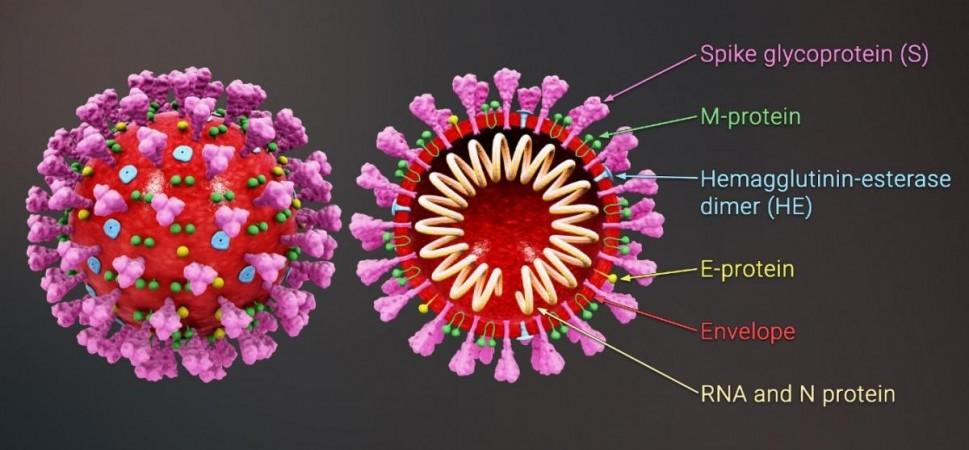The SARS-CoV-2 coronavirus is evolving at a pace that the world is struggling to keep up with. Concerns surrounding the virus' variants—particularly the variants of concern (VOC)—developing mutations that can evade acquired and induced immune response are also on the rise as several studies have found that the structural traits acquired by the virus is making it deadlier. Now, a new study has reported the discovery of new mutations on the notorious spike protein of the Alpha and Beta variants which make them more damaging.
According to the multi-institutional research, the spike protein of the Alpha (B.1.1.7 -UK) and Beta (B.1.351-South Africa) variants—both VOCs—have acquired structural changes that make them more potent. While the discovered mutations in the Alpha variant enable better binding with target receptors, those in the Beta variant are likely to make vaccines less effective against it. "These findings provide structural details on how SARS-CoV-2 has evolved to enhance viral fitness and immune evasion," wrote the authors. The study was published in the journal Science.
Notorious Spike Protein

Over the course of the COVID-19 pandemic, it has been well established that the pathogen's 'spike' (or 'S-protein') plays a crucial role in its infecting mechanism. The' spike'—which is a protein structure on the membrane of the virus— binds with an enzyme known as ACE2 receptor that is found on the surface of several cell types. Following this, it gains entry into cells and infects them. The 'spike' has emerged as the hotspot for all mutations in the virus that make variants more virulent. Most of these mutations are concentrated on the RBD (receptor binding domain)—the section of the spike that is crucial in the coronavirus' docking with the cell and gaining entry to it.
As of May 2021, the World Health Organization (WHO) has categorized four variants of the SARS-CoV-2 as VOCs. Along with Alpha and Beta variants, the Delta (B.1.617.2) and Gamma (P.1-Brazil) variants complete the list. Several studies have found that some of these VOCs can not only evade the natural defenses of the body but also antibodies acquired through vaccination; thereby rendering vaccines ineffective.
For the current study, the team compared the spike protein of the original virus that emerged in Wuhan, China at the end of 2019 with that of the newer and ruinous Alpha and Beta variants. The scientists utilized an advanced imaging technique known as cryo-electron microscopy (cryo-EM) to investigate the differences in the spikes of the original virus and its evolved forms.
Immuno-evasive Beta Variant

The authors observed structural changes in the spike of the Beta variants. According to the findings, these variations lead to changes in the shape of the RBD on the spike, and N-terminal domain (NTD). Resultantly, the vaccine-induced neutralizing antibodies of current inoculations are less adept at binding to the Beta variant. This may help the virus evade immune responses even if people are vaccinated against COVID-19.
"The mutations make antibodies stimulated by the current vaccine less effective. The Beta variant is somewhat resistant to the current vaccines, and we think a booster with the new genetic sequence can be beneficial for protecting against this variant," said Dr. Bing Chen, lead author of the study, in a statement.
Nevertheless, the study also learnt that the noted mutations in the Beta variant make its spike less efficacious in binding with the ACE2 receptor. This suggests that the transmissibility of the variant is lesser than the Alpha variant.
More transmissible Alpha Variant

In the case of the Alpha variant, the team confirmed that a genetic change in the spike proteins enables its better binding with ACE2 receptors, thereby, making it more transmissible. Additionally, testing suggests that the antibodies induced by existing vaccinations can yet neutralize the variant.
In order to be an enhanced threat, a variant of the SARS-CoV-2 virus would have to accomplish three things—spread more easily, evade the immune system in people who have had COVID-19 or those who have been vaccinated, and lead to more severe disease. However, neither the Alpha nor Beta variants meet all the criteria.
"Our data suggest that the most problematic combination of such mutations is not yet present in the existing variants examined here," wrote the authors. Investigations by the team to inform about other variants of concern such as the Delta variant (B.1.617.2-India) are in progress.

















